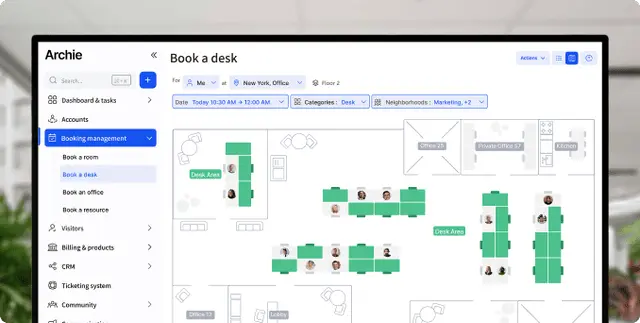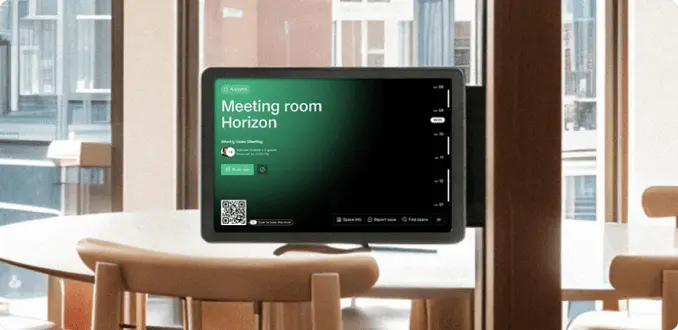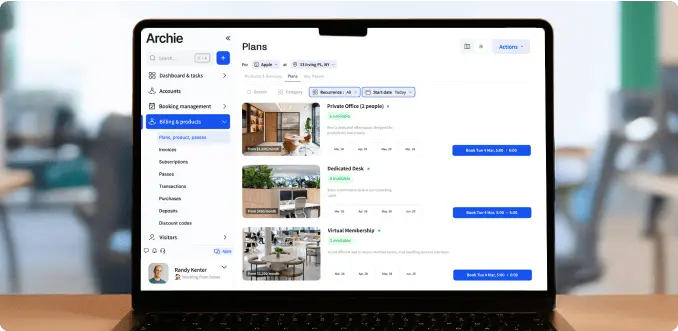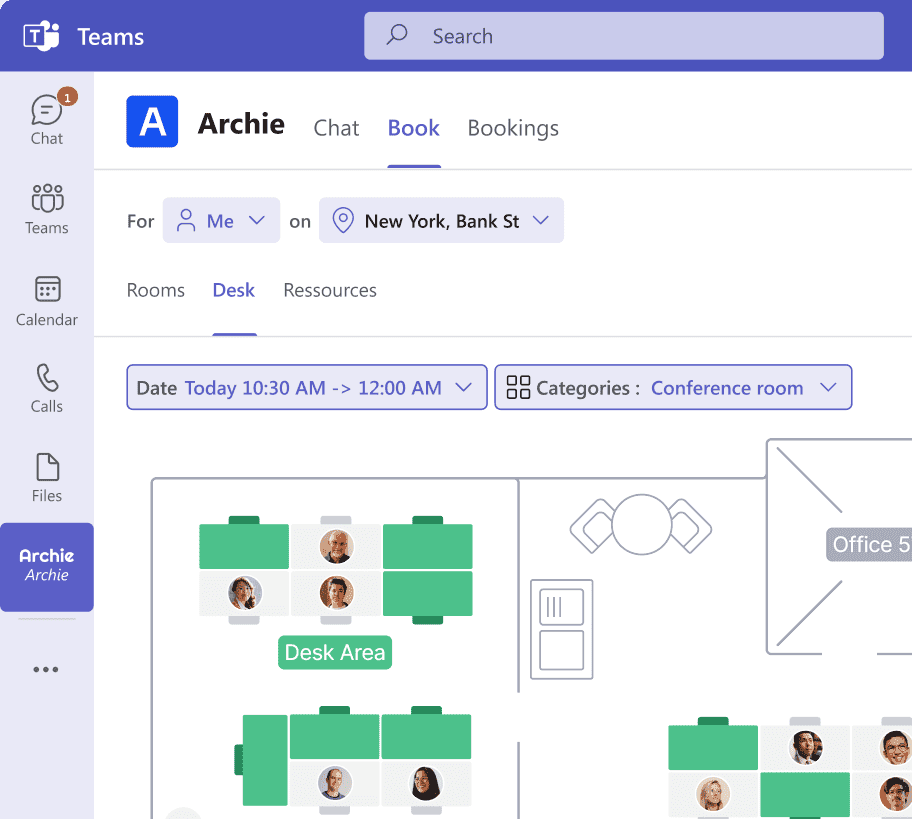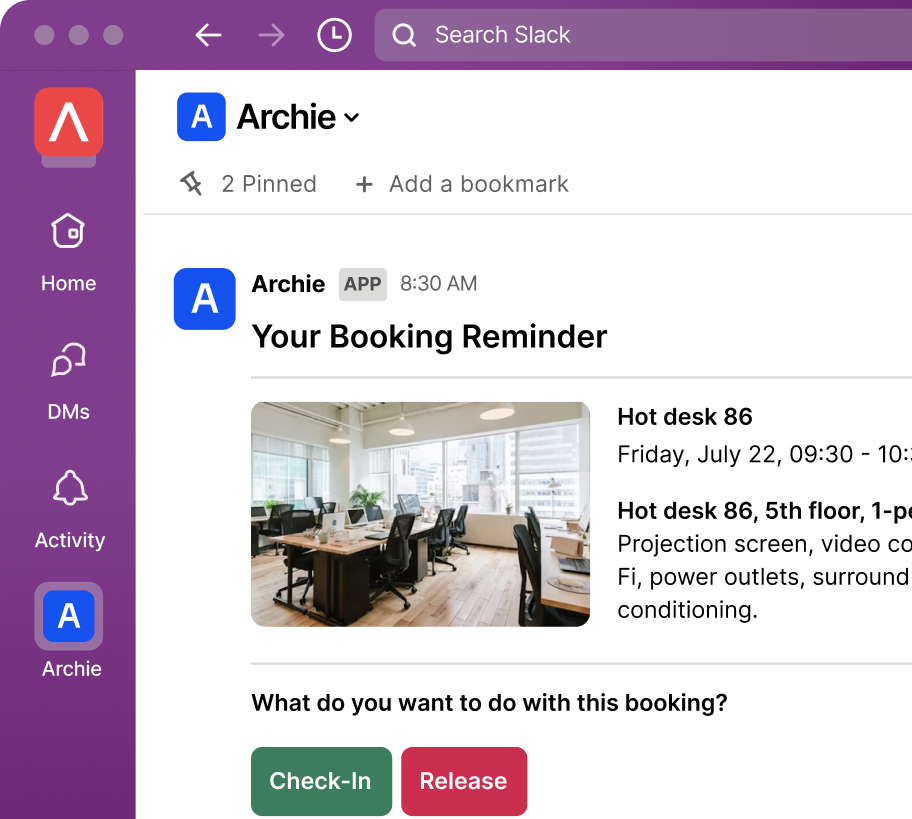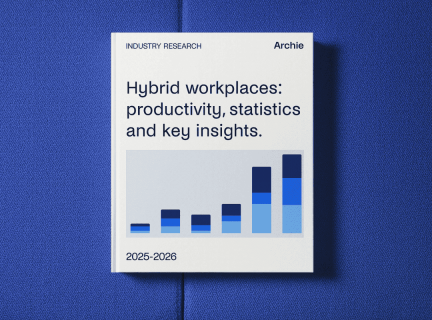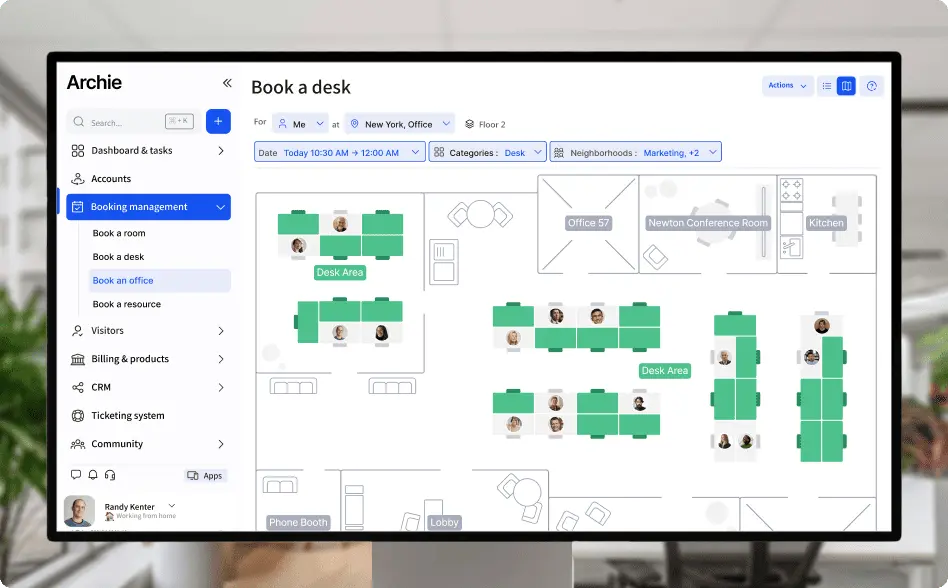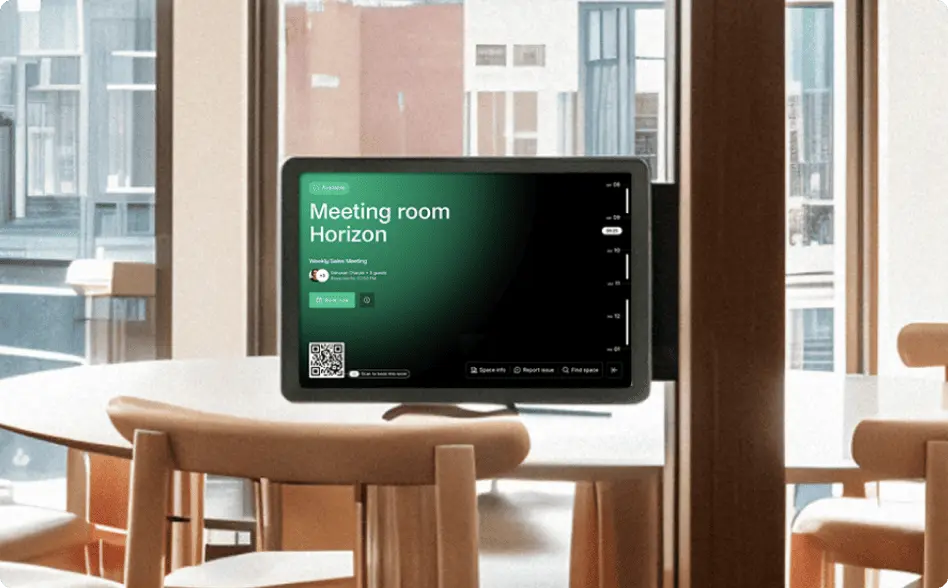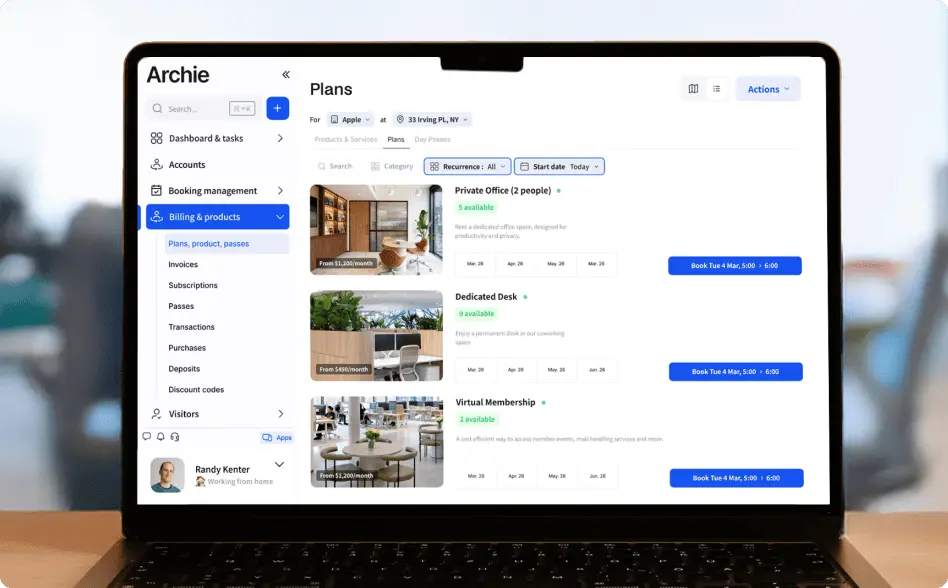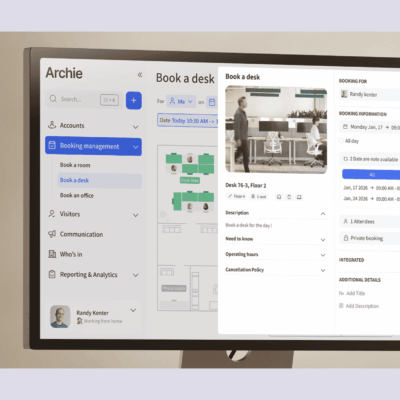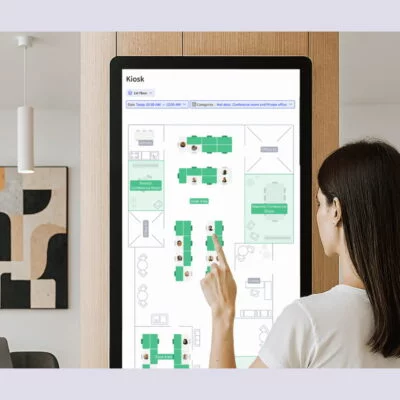Hot desking isn’t exactly new, but it’s definitely gotten more attention since hybrid work became the norm. Is it really as unpopular as people say? And if it is, can better tools like desk booking systems make it easier and more enjoyable?
In this article, we dive into the hot desking statistics and trends for 2026. So, here’s what you need to know.
Key hot desking statistics
Here’s a breakdown of the latest hot desking statistics:
- 60% of U.S. and Canadian employers now use desk sharing or hoteling.
- In North America, only 40% of companies still have a 1:1 desk-to-employee setup (down from 56% in 2023).
- A shortage of desks is one of the top 3 reasons for avoiding the office for 1 in 5 workers.
- Global office workers now spend only 50% of their week in the workplace (was 70% pre-pandemic).
- In strict hot-desk offices, only 39% of employees found the environment enjoyable.
- In well-designed, flexible offices, 85% of workers felt productive.
- Only 42% of employees (and 47% of employers) feel their office setup supports hybrid work well.
- In high-performing offices, 94% of employees have a choice of where to work inside the office.
- 64% of companies rank room & desk booking software as a top priority.
Hot desking research guide
What is hot desking?
Hot desking is when employees don’t have their own assigned desk at work. Instead, they grab any open desk when they come in for the day. It’s kind of like first-come, first-served for desks.
Hot desks are usually:
- Used by different people at different times,
- Booked ahead of time or grabbed on the spot,
- Free of personal items.
Hot desk usage and trends
Hot desking is not necessarily a new concept, but it became popular during and after the pandemic, as more companies moved to hybrid work:
Hybrid work and hot desking go hand-in-hand
In the past, most employees came into the office every day, so each person had their own desk. But with hybrid work, that’s no longer the case. People are now coming in on different days, and often just two or three times a week. This has made many desks sit empty for long stretches — and companies are realizing that keeping a desk for every person no longer makes sense.
As a result, desk sharing is becoming more common. In fact, a 2024 survey by CBRE found that only 40% of companies still have a 1:1 ratio — one desk for each employee — which is down from 56% the year before. And that number is expected to keep dropping. Many companies now have two or more people sharing each desk, depending on how often employees come in. Some are even exploring three or more people per desk, especially as they redesign offices to include fewer desks and more shared spaces like lounges, meeting rooms, and quiet zones.
Hybrid work has also changed when people come to the office. Most employees now prefer to show up midweek — usually Tuesday, Wednesday, and Thursday — skipping Mondays and Fridays if they can. This trend, highlighted in Kisi’s Office Occupancy Index, creates peaks and valleys in office use. Offices can feel packed on certain days and almost empty on others. Because of this, it’s important for RTO companies to plan carefully and make sure there are enough desks on the busiest days — without wasting space the rest of the week.
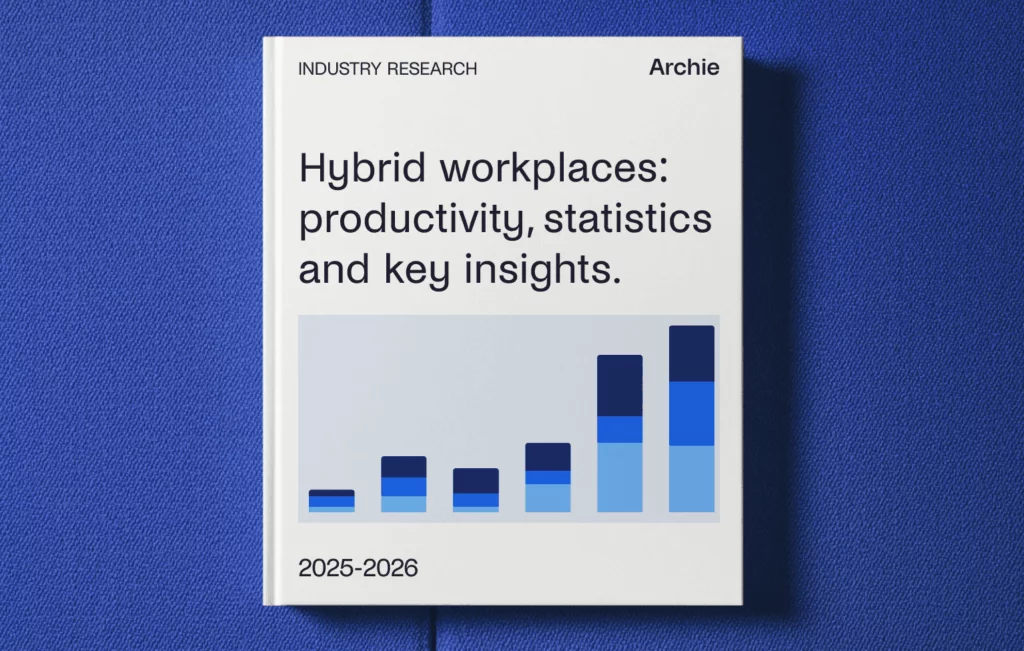
A global shift to shared seating
Hot desking is taking off around the world, but how it’s used — and how people feel about it — can be very different from one region to another. While many companies are moving away from permanent desks, each part of the world has its own pace, work culture, and way of doing things.
As of 2024, about 60% of North American companies use desk sharing or hoteling in some form. It’s helped reduce empty desks and make better use of office space, especially since many offices are still only 40–60% full on an average day.
Europe is ahead of the curve when it comes to flexible work and office design. Since attendance in Europe tends to be lower — with only 26% of companies hitting 80%+ occupancy on peak days — it’s easier to make desk sharing work.
In 2024, only 11% of EU business leaders expected everyone to return to assigned desks full-time, and in the Netherlands, 74% of workers are already allowed to work remotely. According to Forrester, hot desking fits right into the European model of activity-based working (ABW), where employees move between different spaces depending on what they’re doing. This approach is especially common in countries like the UK, the Netherlands, and Nordic nations.
Hot desking is also growing quickly in the Asia-Pacific region, especially in cities like Sydney, Singapore, and Hong Kong, where office space is expensive. In 2024, 49% of companies in the region had a desk-to-employee ratio of 1:1 or less — and many are planning to go further. About 47% of firms expect to increase desk sharing even more in the coming years.
The approach is especially popular in tech and outsourcing companies in places like India and Southeast Asia. However, in countries like Japan, adoption has been slower due to more traditional office expectations.
It’s clear that hot desking is a global trend, but there’s no one right way to do it. What works in Singapore might not work in San Francisco. Each region — and even each company — needs to find the balance that works best for their employees. Speaking of…
Some employees are on the fence
While the trend is clearly toward hot desking, some companies are finding that it doesn’t work for everyone. In 2024, companies like Salesforce actually brought back assigned desks for certain teams after hearing complaints about hot desking. Employees said the office felt too impersonal and that not having a regular spot made it harder to feel comfortable and get work done.
Even in hot desk setups, many employees “unofficially reserve” their favorite desks by arriving early, leaving personal items, or gently staking their claim before others do. It’s a way to create a sense of stability — something hybrid workers especially value when they’re in the office. When you’re already switching between home and work locations, the last thing you want is to spend time searching for a monitor that works or hunting for a charger.
Hot desking research backs this up. A review of 24 studies found that flexible seating — like hot desking — often leads to lower satisfaction. Common complaints include a lack of personal space, hygiene worries, and the stress of not knowing where you’ll sit each day. Some employees also feel less connected to their team or less in control of their workspace when desks aren’t assigned.
But here’s the thing — it’s not that workers hate flexibility. In fact, they like the idea of more freedom and variety. They just want it to be done right. According to the 2024 Owl Labs survey, 91% of employees said they’d be more likely to come into the office if the right perks were available — things like better tech, more privacy, or even just a reliable place to sit.
Desk shortages and return-to-office friction
One of the biggest hot desking issues right now? Not enough desks on busy days. When too many people show up at once, the scramble for space can lead to frustration — or worse, workers leaving. Amazon and Starling Bank both had to delay or adjust return-to-office plans because they simply didn’t have enough desks.
A Remit Consulting survey found that 1 in 5 workers listed “not enough desks” as one of their top reasons for avoiding the office.
A lot depends on office design
Hot desking can be a great solution for today’s hybrid work style, but whether it actually works often comes down to one thing: office design. Just removing assigned desks isn’t enough. To make hot desking successful, the workspace needs to be thoughtfully set up to support how people really work.
Right now, many offices still haven’t made that shift. According to Gensler’s Global Workplace Survey, less than one-third of workplaces have been redesigned in the past three years. And according to Webex, less than half of employees and employers believe their current office spaces are properly equipped for hybrid work. In Europe, those hot desking stats drop even further, with only 32% of employers saying their offices are ready for new ways of working.
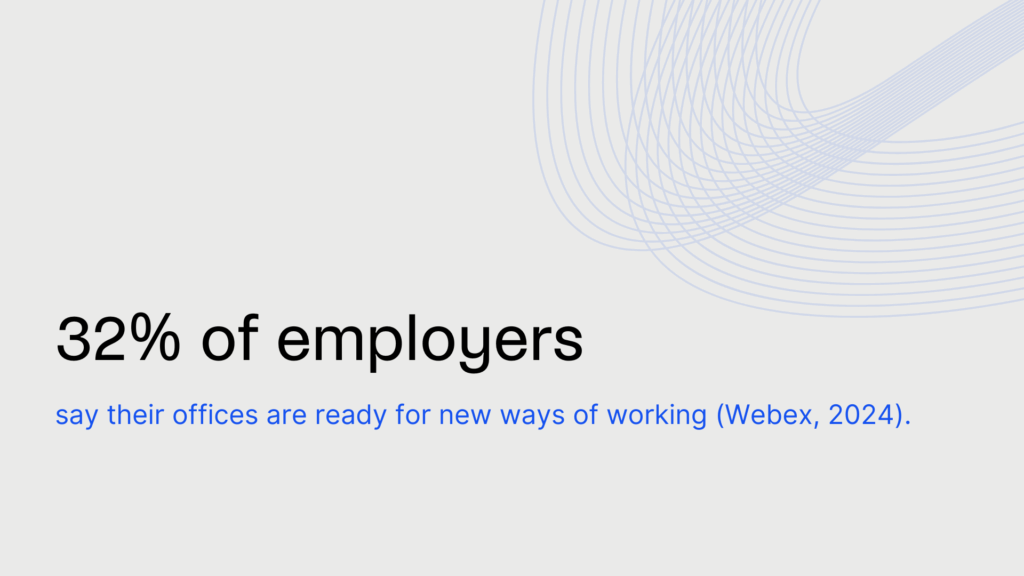
When office design falls short, productivity can take a hit. A 2024 Leesman study found that in offices with unassigned seating but no quiet rooms or variety of spaces, just 41% of workers felt they could be productive. But in well-designed offices that offered a mix of spaces — like focus pods, meeting areas, and comfy nooks — 85% of employees said they were able to work well. That’s nearly as high as those working from home, where 89% of workers reported feeling productive.
This shows that layout matters. People need different spaces for different tasks — whether that’s a quiet spot for deep focus, a casual couch for catching up with a teammate, or a tech-ready pod for video calls. Offices that offer these choices — often called activity-based workplaces — make hot desking much smoother and more enjoyable. In fact, Gensler found that in high-performing workplaces, 94% of employees have a choice of where to work within the office. That flexibility helps people stay focused, feel in control, and do their best work.
Hot desking technology matters, too
One of the most helpful tools is desk and room booking software. These apps let employees see which desks are available and reserve a spot ahead of time — whether on their phone, computer, or even through their work calendar. This helps avoid the chaos of everyone arriving at once and fighting for the best seats. In fact, 64% of companies now list desk and room booking software as one of their top tech priorities, according to CBRE’s 2024 Office Sentiment Survey.
Other tools like smart sensors and check-in systems are also becoming more common. They help track which desks are being used and can even suggest seats based on an employee’s schedule or preferences.
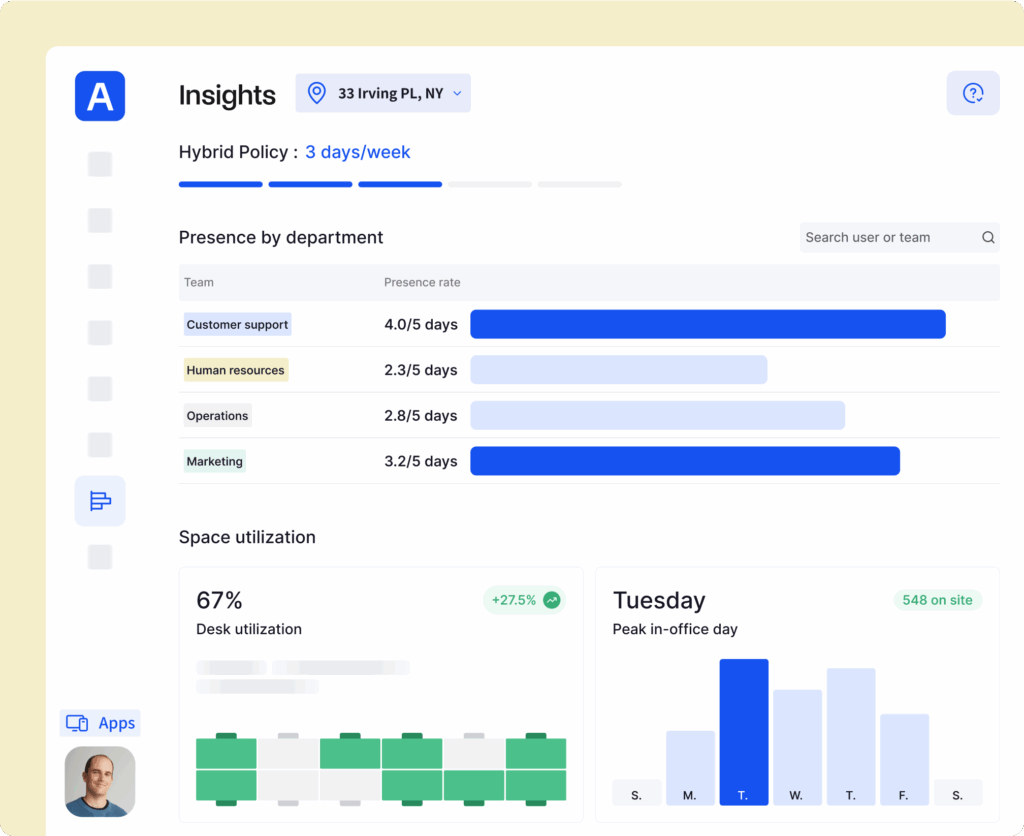
Hot desking benefits and challenges
✅ The good:
- One of the biggest reasons companies love hot desking is the cost savings. Since not everyone needs a desk at the same time, businesses can use less space and save money. According to the Leesman Index, hot desking can cut office operating costs by up to 30% and reduce the amount of space needed by 15–25%.
- Hot desking keeps things flexible. It makes it easier for businesses to grow, shrink, or move teams around without needing to redesign the whole office. It’s especially handy for companies that are growing fast or going through changes.
- It encourages collaboration. Without assigned seats, people often sit near different coworkers each day. This can spark new conversations, fresh ideas, and better teamwork across departments.
⚠️ The bad:
- No personal space. Since you don’t have your own desk, you can’t decorate it or leave personal items behind. For some people, this makes the office feel a bit cold or impersonal. It can also lead to feeling less comfortable or “at home” at work.
- Wasted time setting up. Many workers say one of the most frustrating parts of hot desking is the daily routine: finding a free desk, adjusting the chair and screen, and packing everything up again later. It can take up valuable time and add to the stress of the workday.
- Not enough desks. If more people come into the office than expected, there might not be enough desks for everyone. That can be especially stressful on busy days and can hurt productivity if people can’t find a place to sit.
💻 The verdict:
Hot desking can be great — but only if it’s done right. A 2024 Leesman study found that in offices with no extra spaces (like quiet rooms or meeting pods), only 41% of employees said they could work productively.
However, in offices that offered a mix of spaces for different tasks, like focus areas and team zones, 85% said they could work productively. That’s almost as high as people working from home (89%)!
Good office design, comfy furniture, quiet areas, and useful tools make all the difference. And so does technology that helps employees find a desk quickly and avoid the daily desk hunt. In fact, to help hot desking run smoothly, many companies are using desk and room booking software.

A desk booking system like Archie makes hot desking much easier by letting employees quickly find and reserve a desk using their phone, computer, or calendar. They can see which desks are available in real time, filter by things like location or desk type, and book with just a few clicks. It also connects with tools like Google Calendar, Outlook, Slack, or Microsoft Teams, so everything stays synced.
Many systems also let you set up recurring hot desk bookings, find out where teammates are sitting, and even send alerts when colleagues are coming in. As an admin, you can set booking rules, track office attendance, and see reports on how the office is being used.
The future of hot desking
With many people now splitting their time between home and the office, companies are rethinking how much space they really need and how it’s used. Instead of giving everyone their own desk that might sit empty for days, more businesses are moving toward shared seating. In fact, hybrid work experts predict that by 2026, many companies will have two employees sharing every desk.
Still, companies have to be careful with how they roll hot desking out. While 80% of employers now have some kind of return-to-office policy, only 17% actually enforce it. This gap means companies need to focus on making the office experience more appealing — and hot desking, if done right, can help. Giving employees good tech, easy-to-use desk booking systems, personal storage, and a clean, welcoming space can make a big difference.
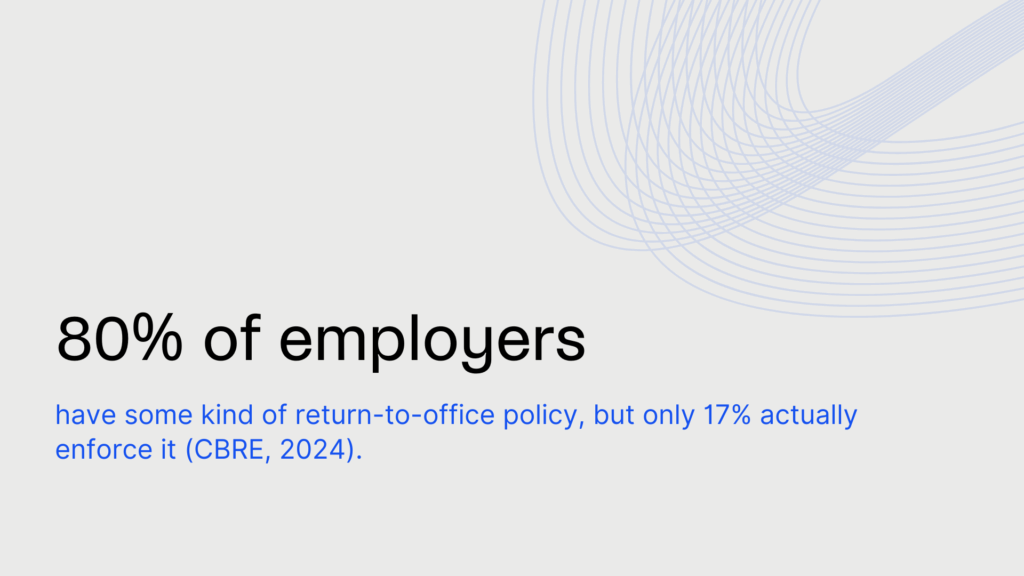
Should you implement hot desking?
Hot desking can be a great fit for modern workplaces — but before jumping in, it’s worth asking: is it right for your team?
Think about your office setup and how your team works. Do you have a lot of part-time or hybrid workers? Do some employees handle sensitive information and need private space? Are most desks sitting empty, or is your space already tight? These answers will help you decide what kind of desk setup makes the most sense. Some teams — especially those that value routine or handle private tasks — may still need permanent desks.
Here are a few tips if you’re thinking about hot desking:
- Create different zones: Have quiet areas for focused work, open spaces for teamwork, and comfy corners for casual chats. Offices with this kind of variety see 25% higher satisfaction.
- Use tech tools: Desk booking apps like Archie let people check availability and reserve a spot ahead of time. Plus, if you want to mix hot desking with a bit more consistency, you can use Archie to set up recurring desk bookings — if someone comes into the office on the same days each week, they don’t have to book your desk every time. You can also control how far in advance employees can book, who’s allowed to book certain spots, or what happens if someone doesn’t check in.
- Add personal touches: Lockers, day-use name tags, or allowing small personal items can make flexible workspaces feel a bit more familiar and friendly.
- Set clear expectations: Have a simple code of conduct explained in a hybrid policy — like keeping noise low, cleaning up, and not leaving personal things behind — so everyone feels respected in a shared space.
- Check in often: Ask for feedback regularly and watch how the space is used. You can always tweak the layout or rules to make things better. At the moment, only 11% of workers say their team helped decide how hybrid work should be set up. When companies include employees in these choices, it can lead to better teamwork, less stress, and happier staff.
Hot desking isn’t just about saving space. When done well, it can help people feel more connected, encourage teamwork, and even boost productivity. When done poorly, though, it can make the office feel stressful and unwelcoming. That’s why it’s important to implement hot desking carefully!
Summary of the latest hot desking statistics
- 60% of U.S. and Canadian employers use desk sharing or hoteling (2024).
- In North America, only 40% of companies still have a 1:1 desk-to-employee setup, down from 56% in 2023.
- Global office workers spend about 50% of their week in the workplace, down from 70% pre-pandemic.
- Many offices are 40 to 60% full on an average day (2024).
- In Europe, only 26% of companies hit 80% plus occupancy on peak days (2024).
- In 2024, only 11% of EU business leaders expected a full return to assigned desks.
- In the Netherlands, 74% of workers are allowed to work remotely (2024).
- In APAC, 49% of companies had a 1:1 desk ratio or less (2024).
- About 47% of APAC firms expect to increase desk sharing further.
- In strict hot-desk offices, only 39% of employees found the environment enjoyable.
- In well-designed, flexible offices, 85% of workers felt productive.
- With unassigned seating and no quiet rooms or variety, only 41% felt productive.
- Working from home, 89% said they were productive.
- Only 42% of employees and 47% of employers feel their office setup supports hybrid work well.
- In high-performing workplaces, 94% of employees have a choice of where to work inside the office.
- 64% of companies rank room and desk booking software as a top priority.
- A shortage of desks is a top 3 reason for avoiding the office for 1 in 5 workers.
- Less than one third of workplaces have been redesigned in the past three years.
- Less than half of employees and employers believe their current office spaces are properly equipped for hybrid work.
- In Europe, only 32% of employers say their offices are ready for new ways of working.
- Offices that offer a variety of spaces see 25% higher satisfaction.
- Only 11% of workers say their team helped decide how hybrid work should be set up.
- Hot desking can cut office operating costs by up to 30% and reduce required space by 15 to 25%.
- 80% of employers have some kind of return-to-office policy, but only 17% enforce it.
- Prediction for 2026: many companies will have two employees per desk.
Sources
- Gensler, Global Workplace Survey 2024.
- Matthew Boyle, Carrier Management, To Get Workers Back to the Office, Some Firms Bring Back Assigned Desks.
- Sepideh Masoudinejad , Jennifer A. Veitch, Journal of Environmental Psychology, The effects of activity-based workplaces on contributors to organizational productivity: A systematic review.
- Nikki N Nguyen, Krishna V Varsani, Maria-Irini Avgoulas, Christa Carey, Tish Drakopoulos, Lindsay Carey, The Effects of Hot-desking on Staff Morale: An Exploratory Literature Scoping Review.
- CBRE, Americas Office Occupier Sentiment Survey.
- CBRE, European Office Occupier Sentiment Survey.
- CBRE, Asia-Pacific Office Occupier Sentiment Survey.
- Gallup, Hybrid Work Indicator.
- WORKTECH Academy, The World of Work 2025 Report.
- Leesman Index, The Desk Dilemma.
- Remit Consulting, Office Occupancy Trends.
- Owl Labs, State of Hybrid Work 2024.
- Kisi, Office Occupancy Index.
- Webex, Hybrid Work Global Research Report.
- Archie, Hybrid Work Statistics in 2025: Productivity & Preferences.

Berenika Teter
Archie's Content Manager, fueled by filter coffee and a love for remote work. When she’s not writing about coworking spaces and hybrid workplaces, you can probably find her exploring one.
